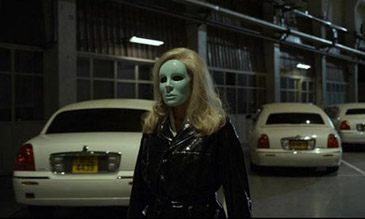CIFF: Holy Motors
By Steven Pate in Arts & Entertainment on Oct 16, 2012 8:40PM
 This is part of Chicagoist's coverage of the Chicago International Film Festival.
This is part of Chicagoist's coverage of the Chicago International Film Festival.
Holy Motors, which appeared on Chicago screens for the first time over the weekend as part of the Chicago International Film Festival and comes to The Music Box in November, is overstuffed with startling things [spoilers]: a man stabbing his doppelganger in the neck; Kylie Minogue singing a wistful song and perhaps committing suicide; Eva Mendes kidnapped and dressed in a burqa by a priapic imp; the terrifying rage of an emotionally abusive father; a motion-capture sequence for the sexual congress of some sort of animated space dragons; pastiches of cinema history from the pre-cinematic photographs of Étienne-Jules Marey to Pixar's Cars; the most human-chimp sexual innuendo since Max mon amour. All these scenes are strung together by a premise so mysterious that it is likely to either infuriate or infatuate you (c.f. this year's Cannes reaction).
The protagonist of the film is Monsieur Oscar, a shadowy performer of sorts whose vocation requires him to inhabit a radically different role at every appointment for which he has been booked (on this day, he has nine). Shuttling him around Paris is his driver Céline, pilot of the anonymous white limousine which serves as his headquarters and as a sort of mobile film set trailer and dressing room. His first appointments as an impoverished female beggar and then as a digital motion capture stand-in prompt wonder at the bodily transformation undertaken for the roles. As the appointments become darker, more violent and more intense, unanswered questions about why these spectacles are occurring, who is watching them, who is paying for them, how the other people in these encounters seem to recognize him as his character become more urgently felt, but it is director Leos Carax's great talent to make the preservation of these mysteries part of their enjoyment.
With Holy Motors, Carax has achieved an incendiary, Halley's comet-like return to the cinematic firmament after a 13-year lapse gave us only fragments. Shot through with an angry, anarchic energy, loaded down with ideas from the banal to the profound, and bursting with mesmerizing visuals, the film is the most interesting thing on screen so far this year. Departures from narrative convention this bold will always turn off many, but Carax seems to care all that much: "I don't know who the public is, except a bunch of people who will soon be dead." Alright then.
This film could not exist without the incredible force that is Denis Lavant. Think Tom Hanks has a full plate with a measly six roles in Cloud Atlas? Lavant plays a character who himself plays at least ten different roles. Combining the deadpan pliability of Buster Keaton with the craggy polymorphism of a Gary Oldman, Lavant transmits an unpredictable intensity from which it is impossible to turn away. "If Denis had said no," says Carax, "I would have offered the part to Lon Chaney or to Chaplin. Or to Peter Lorre or Michel Simon." Diminutive but lithe, live wire Lavant seems capable of anything at any given moment (see for example the unforgettable closing scene of Claire Denis' Beau Travail or the sequence set to Bowie's "Modern Love" from his breakthrough role in Carax's first film), and Carax has crafted a cinematic experience to let that precisely that occur.
From its opening sequence, when a man (played by Carax himself) wakes up and discovers not only a mysterious door leading from his bedroom into a movie palace filled to capacity with a creepily motionless audience but that the key to open this door is attached to his finger, Holy Motors wears its own obsession with cinema on its sleeve. Through overt references to cinema history from Vidor to Franju to Godard to Lynch, and in less-intentional resonances (a poster that recalls Uncle Boonmee Who Can Recall His Past Live, a Limousine-bound plot that plays like a Parisian echo to the New York of Cronenberg's Cosmopolis, etc.) the film situates itself within a dialog about the movies. Shot reluctantly on digital, the film's persistent investigation of the nature of spectacle and our evolving participation in it that takes this line of inquiry beyond mere allusion.
As fantastic and surreal as the movie is, there is no mistaking an underlying critique of a world lacking in anything "real." Each of Oscar's appointment lasts only long enough for us to buy into it, so that we are ripped away right at the moment we found ourselves able to emotionally connect with the characters and situation at hand, despite "knowing" the whole thing to be an act. We are never quite sure when an individual's persona is on, or if there's anything underneath there at all. If all we do is delight in being observed, the film supposes, "What if there is no beholder?" If Holy Motors were the last movie ever made, we would have to nod reluctantly at a sendoff so befittingly dark and inscrutable, believing that this final fever dream may hold as much truth as any more pious accounting of the cinematic age, even if we'd prefer it to be otherwise.